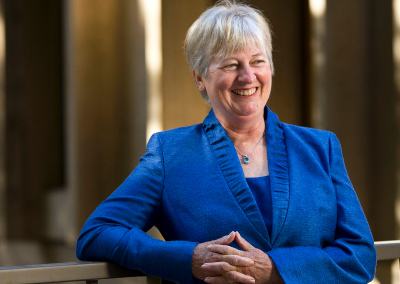About 100 students, staff, and faculty confronted issues of sexual harassment and sexual assault on campus during a May 10 town hall meeting convened by Alison Galloway, campus provost and executive vice chancellor.
"How do we change this culture," Galloway asked. "This isn't about policy changes or law changes. It's about behavior changes. How do we act? We have a chance to make a difference."
Galloway noted that many women faculty have experienced and survived sexual harassment through their careers, saying “it does not need to be that way in the future.” A major culture shift “won’t be easy,” she acknowledged, adding she is optimistic because of new UC-wide policies regarding sexual assault and sexual violence and widespread campus and public attention on the issue. "Things have changed."
When she first announced the town hall in late March, Galloway said, “We, as faculty, must do more than comply with mere law or university policy. Indeed, compliance to these standards is a basic job requirement. Sexual harassment isn't just a compliance problem; it is a culture problem.”
In emotional comments, students and faculty described their frustration with past practices that led to minor sanctions even when harassing behavior was investigated and found to have taken place.
“We need to change the culture that makes it safe for this behavior to continue,” one longtime faculty member said after asking if any faculty member had ever lost their job following an investigation.
The answer is “no,” Galloway said, also noting that under current policies faculty discipline is a lengthy process. “That’s why we as faculty need to come together and not tolerate this kind of behavior.”
Formerly, conversations about sexual violence, harassment, and prevention were only in regard to women, she said. “We relegated it to the Women's Center and tended to blame the victim. We no longer blame the victim and we won't tolerate ‘minor acts.’” She also acknowledged that “this issue is much broader and affects people throughout our community—not just women.”
Galloway announced that she has approved funding to add more investigators to the Title IX office, which investigates complaints of sexual violence and sexual assault involving campus affiliates.
She also pointed out that members of the campus community can seek confidential assistance and advice at the CARE office, care.ucsc.edu, and report incidents and receive help from UC Santa Cruz police.
She called on faculty and the academic senate to join her in forming a work group of faculty, staff, and students to develop changes and move the campus community beyond mere compliance to a true culture change.
“Ultimately, it is about changing behavior. We need to start the conversation.”



